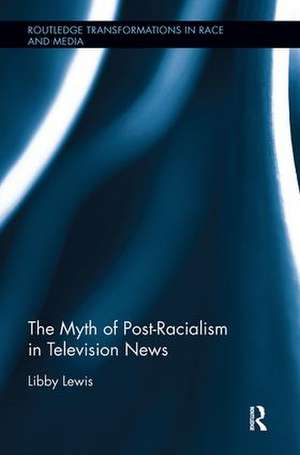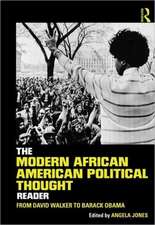The Myth of Post-Racialism in Television News: Routledge Transformations in Race and Media
Autor Libby Lewisen Limba Engleză Paperback – 22 dec 2017
| Toate formatele și edițiile | Preț | Express |
|---|---|---|
| Paperback (1) | 434.45 lei 6-8 săpt. | |
| Taylor & Francis – 22 dec 2017 | 434.45 lei 6-8 săpt. | |
| Hardback (1) | 1053.16 lei 6-8 săpt. | |
| Taylor & Francis – 9 sep 2015 | 1053.16 lei 6-8 săpt. |
Din seria Routledge Transformations in Race and Media
-
 Preț: 349.10 lei
Preț: 349.10 lei -
 Preț: 376.10 lei
Preț: 376.10 lei -
 Preț: 350.42 lei
Preț: 350.42 lei -
 Preț: 422.59 lei
Preț: 422.59 lei -
 Preț: 394.02 lei
Preț: 394.02 lei - 16%
 Preț: 290.62 lei
Preț: 290.62 lei -
 Preț: 372.84 lei
Preț: 372.84 lei -
 Preț: 186.91 lei
Preț: 186.91 lei -
 Preț: 390.03 lei
Preț: 390.03 lei
Preț: 434.45 lei
Nou
Puncte Express: 652
Preț estimativ în valută:
83.14€ • 90.28$ • 69.84£
83.14€ • 90.28$ • 69.84£
Carte tipărită la comandă
Livrare economică 22 aprilie-06 mai
Preluare comenzi: 021 569.72.76
Specificații
ISBN-13: 9780815386421
ISBN-10: 0815386427
Pagini: 202
Ilustrații: 2 Line drawings, black and white; 2 Illustrations, black and white
Dimensiuni: 152 x 229 x 14 mm
Greutate: 0.26 kg
Ediția:1
Editura: Taylor & Francis
Colecția Routledge
Seria Routledge Transformations in Race and Media
Locul publicării:Oxford, United Kingdom
ISBN-10: 0815386427
Pagini: 202
Ilustrații: 2 Line drawings, black and white; 2 Illustrations, black and white
Dimensiuni: 152 x 229 x 14 mm
Greutate: 0.26 kg
Ediția:1
Editura: Taylor & Francis
Colecția Routledge
Seria Routledge Transformations in Race and Media
Locul publicării:Oxford, United Kingdom
Public țintă
Postgraduate and UndergraduateCuprins
Introduction 1. Professionalizing and Palatable "Blackness" 2. Branding and Marketing "Blackness" 3. From Stumbling Block to Stepping Stone 4. Owning the "Ghetto" Shows 5. Rules of Engagement: The Politics of Race, Gender, and Sexuality 6. Barack and Michelle Obama as Signs of Progress and Threat Concluding Remarks
Notă biografică
Libby Lewis is a Lecturer in African American Studies at the University of California, Los Angeles, USA. She earned a Ph.D. in African Diaspora Studies with a Designated Emphasis in Women, Gender, and Sexuality Studies from the University of California, Berkeley, USA.
Recenzii
"Libby Lewis has provided an essential tool in giving agency and voice to the many Black journalists who have tirelessly worked to provide complex representations of people of color in their stories and news organizations."
–Akil Housten, Ohio University, USA
"The book’s argument is strengthened by firsthand accounts by TV journalists who discuss their experiences with management decisions, including promotions and management of African American journalists within media corporations. Lewis also underscores the complexity of the newsroom environment for black female journalists. The focus of the book is about not just journalists, but also media portrayals of blackness, especially as observed in reporting on Barack and Michelle Obama. Lewis offers a convincing case that the myth of postracialism is nothing but a myth, and that the reality of American journalism is filled with examples of marginalization of African Americans."
- Y. Kiuchi, Michigan State University, CHOICE
"The strength of this book lies in its detailed use of qualitative approaches featuring more than 100 interviews with mostly Black journalists who discussed their experiences of enduring multiple forms of oppression while working in
the television news industry. (...) Lewis’s book represents a timely contribution, as we need insights into the seeming paradox of heightened aspirations of racial transcendence celebrated during Obamamania and the invisible hand of Whiteness that ultimately influence social transactions between Black journalists and their White counterparts."
- Christopher Brown, Minnesota State University, USA, Journalism & Mass Communication Quarterly
–Akil Housten, Ohio University, USA
"The book’s argument is strengthened by firsthand accounts by TV journalists who discuss their experiences with management decisions, including promotions and management of African American journalists within media corporations. Lewis also underscores the complexity of the newsroom environment for black female journalists. The focus of the book is about not just journalists, but also media portrayals of blackness, especially as observed in reporting on Barack and Michelle Obama. Lewis offers a convincing case that the myth of postracialism is nothing but a myth, and that the reality of American journalism is filled with examples of marginalization of African Americans."
- Y. Kiuchi, Michigan State University, CHOICE
"The strength of this book lies in its detailed use of qualitative approaches featuring more than 100 interviews with mostly Black journalists who discussed their experiences of enduring multiple forms of oppression while working in
the television news industry. (...) Lewis’s book represents a timely contribution, as we need insights into the seeming paradox of heightened aspirations of racial transcendence celebrated during Obamamania and the invisible hand of Whiteness that ultimately influence social transactions between Black journalists and their White counterparts."
- Christopher Brown, Minnesota State University, USA, Journalism & Mass Communication Quarterly
Descriere
This book explores the written and unwritten requirements Black journalists face in their efforts to get and keep jobs in television news. Informed by interviews with journalists themselves, Lewis examines how raced Black journalists and their journalism organizations process their circumstances and choose to respond to the corporate and institutional constraints they face.

















